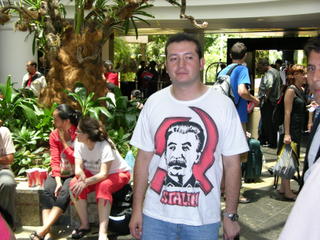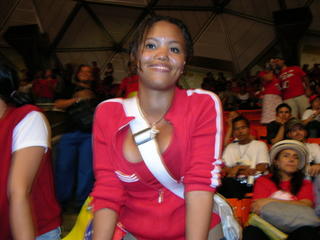
Abimael Guzman a/k/a
Presidente Gonzalo, with 18 other individuals, is finally going to trial by a Civil Court (as in non-military)on charges of terrorism. Last time it came up, it ended with a mis-trial of sorts in November of 2004. And even before that, the original military case, was vacated due to a finding that the Military Court lacked jurisdiction over civilians. The Nuevo Herald has an article
here.
Guzman is accused of instigating one of Latin America's bloodiest conflicts, which left around 70,000 dead from 1980 y el 2000.
The former phillosophy professor in Ayacucho, led a splinter faction that broke away from Peru's Maoist-line Communist Party. Starting with small cells - they had an estimated 12 to 50 members in the early 70's. At Guzman's direction, they began an underground study of the works of Peruvian intellectual Jose Carlos Mariategui, as well as the classics of Marxist-Leninist though such as Mao and Lenin with the object of producing a "Peruvian" type of Communism. It was Mariategui's phrase "Shining Path" that gave the group its name. As the nucleus of students and others grew, previous graduates went to work as rural teachers continuing their work with the students, while others started infiltrating labor and peasant groups in other regions of the country.
As the 70's went by, it increasingly became a cult of personality based around Guzman, whose orders were unquestionably followed, and he became known as
"Presidente" Gonzalo. By the end of the decade they had decided the conditions were ripe for armed struggle, and Guzman's writings became increasingly apocalyptic in tone. He referred to the Senderistas as being the "few chosen" of the "many called", of them having a "pure light" in their "breasts and in their soul," and talked about how they would accomplish a cleansing of Peruvian Society, by removing the serpents and cancers.
When the actual armed struggle began, it started with relatively small scale actions, but quickly grew in scope and viciousness. The Peruvian military responded with brutality of its own to the threat and soon began sweeping the hills and jungles. Something about Sendero's millenarian language struck a chord with some Andean residents, which combined with the military's brutality led to some degree of support for the rebels. Their disciplined cadres soon exerted their puritanical control over chunks of Ayachucho, indoctrinating more young people. But their heavy hand was soon resented by many villagers, who began their own paramilitary organizations with the militaries help. This cycle of violence and revenge soon plunged parts of Peru into a horrific Civil War.
In this environment, Guzman himself endorsed some of his organizations bloodiest actions, which took place against villagers. In one such act of vengeance, Senderistas attacked the village of Lucanamara and murdered more than 70 unarmed men, women and children. Guzman himself referred to it as a "needed" "massive blow", against his opponents, although he cyncically did say that it was an "excess" for which he was not responsible, since he was hundreds of miles away. But then again, he also did say that it was an action planned by the Central Committee - which was essentially just him and a couple of his women.
A true evil mastermind, who might finally pay for his crimes.













